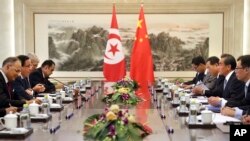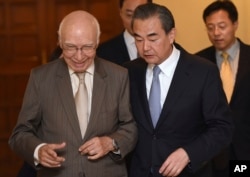China says its large economic collaboration program with Pakistan has entered “the stage of early harvest", making it the “fastest and most effective" among all projects in Beijing’s Belt and Road Initiative, or BRI.
President Xi Jinping launched the China-Pakistan Economic Corridor, or CPEC, two years ago, during his landmark visit to Islamabad. Cooperation has since cemented decades-old relations between the traditionally close allies.
China is investing about $60 billion on a network of roads, railways, fiber optic cables, energy pipelines, industrial clusters and special economic zones in Pakistan.
The corridor will link China's western region of Xinjiang to the Pakistani port of Gwadar on the Arabian Sea, giving the Chinese region the shortest trade route to international markets.
China's acting ambassador to Islamabad, Lijian Zhao, says that 19 CPEC projects worth about $19 billion are either completed or in progress.
“CPEC, as a pilot and major project of BRI, is now the fastest and most effective project among all the projects under the BRI,” he told a seminar in Islamabad.
He described the cooperation as an “unprecedented undertaking” in the history of China-Pakistan relations.
Economic cooperation connected to CPEC has employed thousands of Pakistanis and officials anticipate tens of thousands more will be hired in the next few years.
Gwadar is in Pakistan's Baluchistan province, where deadly attacks on CPEC workers have taken place in recent months.
Some critics in Pakistan have raised concerns about the viability of CPEC, while others have questioned its implications for the country. But officials dismiss the skepticism as unfounded.
“Despite (the fact) there is this criticism and noises here and there, after this four years of hard work and joint efforts of both countries, the CPEC has not been affected by those noises. I can report to you that CPEC is going on very well on the ground,” said the Chinese envoy. He did not elaborate further.
Most of the CPEC projects are in Baluchistan. Pakistani officials allege rival India’s intelligence agency is behind the militant attacks in the province in an attempt to sabotage the Chinese investment.
New Delhi denies the charge, but officials there have voiced concerns over the corridor because it passes through the Pakistan-controlled portion of Kashmir, which is divided between India and Pakistan and both claim the Himalayan region in its entirety.
Pakistan’s foreign secretary, Tehmina Janjua, while addressing the conference, explained security challenges facing her country’s project with China.
“May I point out, unfortunately, our eastern neighbor (India) has publicly announced its opposition to CPEC. The grounds they give for their opposition are baseless,” Janjua noted.
She went on to denounce India’s opposition as “appalling” for a project that she said would bring development and prosperity to the people of Kashmir.
“China and Pakistan stand shoulder to shoulder in developing CPEC on the agreed time lines. We will continue to march ahead with complete determination, ignoring the negative voices and forcefully responding to any threat to CPEC,” said Janjua.
The Pakistani military has deployed thousands of security personnel to guard the projects and protect Chinese experts and workers.
China has also rejected reported U.S. concerns China plans to turn Gwadar into a Chinese naval base.
Major infrastructure projects being established in the Chinese-funded port of Gwadar include a Free Zone and a new international airport that will be operational by next year, officials say.
While new highways are being built and existing roads upgraded to link areas under CPEC, a coal fired power plant in the central city of Sahiwal has recently been completed, adding 1,320-megawatts of electricity to Pakistan's national grid.
A second 1,320-megawatt coal fired power plant in the southern port city of Karachi is expected to be inaugurated by November at an estimated cast of about $2 billion.
China is also focusing on upgrading Pakistan's railways, increasing average speeds to about 180 kilometers an hour from the current average of 80 kilometers an hour, said Chinese envoy Zhao.





